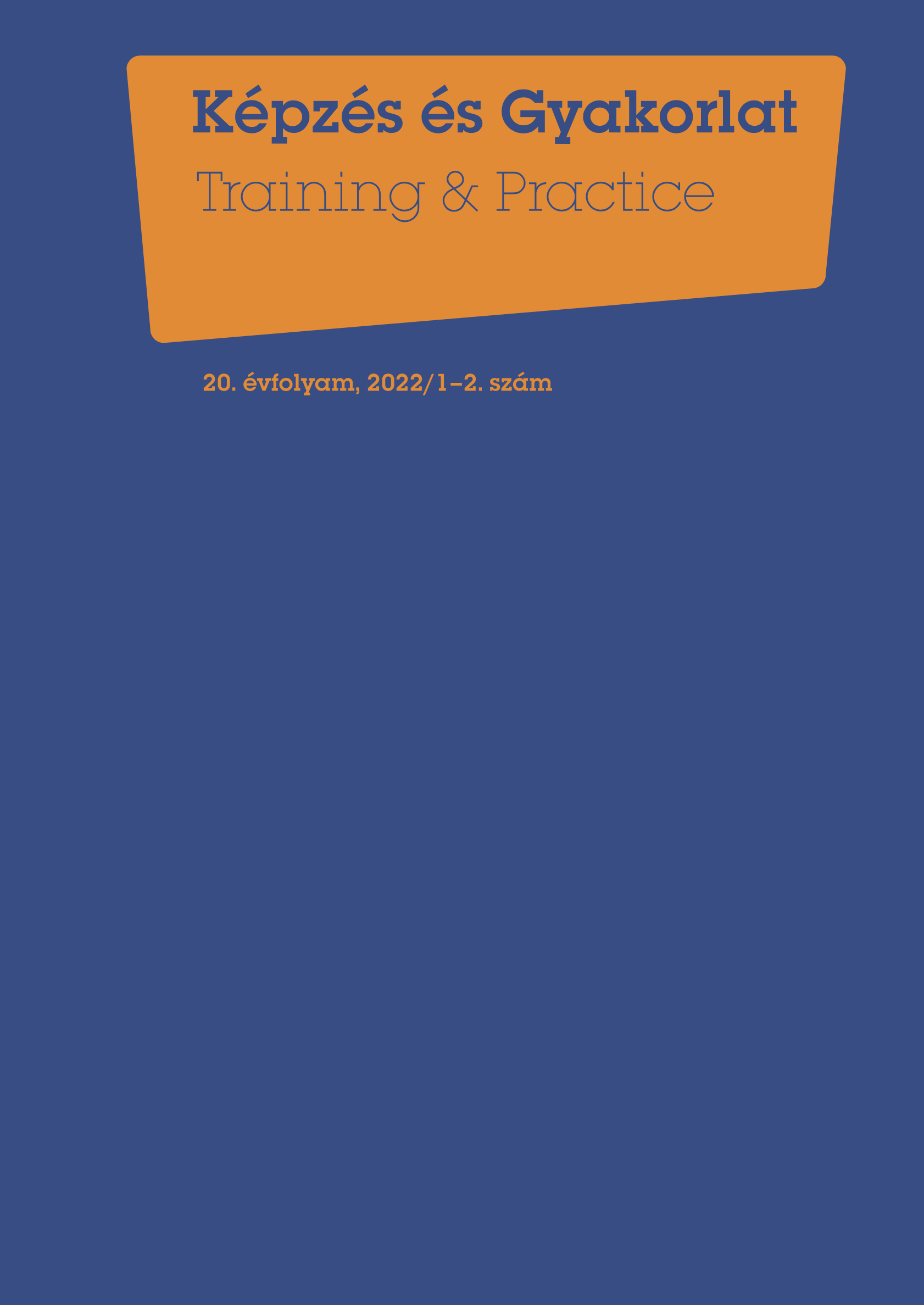Correctional Educators’ Perceptions of Juvenile Correctional Facilities Reflected in Metaphors
DOI:
https://doi.org/10.17165/TP.2022.1-2.3Abstract
The juvenile detention center or reformatory is a specific world that operates simultaneously as a penal and a pedagogical institution. On the one hand, as part of the child protection system, it has an educational function, on the other hand, correctional education is a judicial measure applicable to juvenile offenders in the case of a criminal offense. The aim of the present study is to provide through correctional educators’ metaphors an insight into how educators relateto their workplace and the way they experience working in a closed institution. The metaphors used by correctional educators outline the specifics of the institution in a typical way; in addition, we can also obtain a large amount of information about the educational work carried out in the institution.
References
Baska, G. (2007). Egy városi tanító életvilága a 19. század második feléből. [Doktori disszertáció]. ELTE Neveléstudományi Doktori Iskola, Budapest.
Dudás, M. (2007). Tanárjelöltek belépő nézeteinek feltárása. Falus, I. (Ed.), A tanárrá válás folyamata, (pp. 46–121). Budapest: Gondolat Kiadó.
Elliot, R. K. (1984). Metaphor, imagination and conceptions of education. In W. Taylor (Ed.), Metaphors of education (pp. 38–53). London: Heinemann Educational.
Gilligan, R. (1999). Enhancing the resilience of children and young people in public care by encouraging their talents and interests. Child and Family Social Work, 4. sz. pp. 187–196. DOI: https://doi.org/10.1046/j.1365-2206.1999.00121.x
Hegedűs, J. (2007). Fiatalkorú bűnelkövetők gyermekkora és a javítóintézetben töltött éveik pedagógiai vizsgálata. [Doktori disszertáció]. ELTE Neveléstudományi Doktori Iskola, Budapest.
Hegedűs, J. (2010). Nevelésre ítéltek között – javítóintézeti pedagógusok pedagógiai kultúrája. In Hegedűs J. (Ed.), A javítóintézet világa, (pp. 64–96). Budapest: Eötvös József Könyvkiadó.
Kissné Zsámboki, R. – Patyi, G. (2018). Angyalkertek egykor és ma – Az óvodapedagógus hallgatók metaforáiban megjelenő óvodakép pedagógiatörténeti vonatkozásai és jelenkori sajátosságai. Képzés és Gyakorlat: Training and Practice, 16 évf. 4. sz. pp. 17–28. DOI: https://doi.org/10.17165/TP.2018.4.2
Munby, H. – Russell, T. (1990). Metaphor in the study of teachers' professional knowledge. Theory into Practice, 29 évf. 2. sz. pp. 116–121. DOI: https://doi.org/10.1080/00405849009543441
Őrley, Z. (2011). Az afázia metaforája. Rehabilitáció, 21 évf. 2-3 sz. pp. 59–63.
Perry, C. – Cooper, M. (2001). Metaphors are good mirrors: reflecting on change for teacher educators. Reflective Practice, 2. évf. 1. sz. pp. 41–52. DOI: https://doi.org/10.1080/14623940120035514
Pénzes, É. (2008). Metaforák a (gyógy)pedagógiában. Új Pedagógiai Szemle, 58 évf. 6–7 sz. pp. 228-238.
Réthy, E. (2001). Motivációs elképzelések. In: Golnhofer E. – Nahalka I. (Eds.), A pedagógusok pedagógiája, (pp. 177–200). Budapest: Nemzeti Tankönyvkiadó.
Sántha, K. (2006). Mintavétel a kvalitatív pedagógiai kutatásban. Budapest: Gondolat Kiadó. Sfard, A. (1998). On two metaphors for learning and the danger of choosing just one. Educational Researcher, 27. évf. 2. sz. pp. 4–13. DOI: https://doi.org/10.3102/0013189X027002004
Szabolcs, É. (2001). Kvalitatív kutatási metodológia a pedagógiában. Budapest: Műszaki Könyvkiadó.
Szathmári, I. (2010). Stíluseszközök és alakzatok kislexikona. Budapest: Tinta Könyvkiadó. Szivák, J. (2002). A pedagógusok gondolkodásának kutatási módszerei. Budapest: Műszaki Könyvkiadó.
Szivák, J. (2003). A reflektív gondolkodás fejlesztése. Budapest: Gondolat Kiadó.
Szivák, J. (2010). A reflektív gondolkodás fejlesztése. Magyar Tehetségsegítő Szervezetek Szövetsége.
Tamás, K. (2017). Inkluzív nevelés az óvodában. [PhD disszertáció]. ELTE PPK Neveléstudományi Doktori Iskola, Budapest.
Tóthné Aszalai, A. (2018). A metaforakutatás módszere a dadogás megismerésében In: Karlovitz, J. T. (Ed.), Elmélet és gyakorlat a neveléstudományok és szakmódszertanok köréből, (pp. 109-116). Komárno, Szlovákia: International Research Institute.
Vámos, Á. (2001a). Iskolai értékelés fogalmának elemzése metaforahálóval. In: Golnhofer E. – Nahalka I. (Eds.), A pedagógusok pedagógiája, (pp. 283–306.). Budapest: Nemzeti Tankönyvkiadó.
Vámos, Á. (2001b). Metafora felhasználása a pedagógiai fogalmak tartalmának vizsgálatában. Magyar Pedagógia, 101. évf. 1. sz. pp. 85–108.
Vámos, Á. (2003a). Metafora a pedagógiában. Budapest: Gondolat Kiadó.
Vámos, Á. (2003b). Tanárkép, tanárfogalom a családban. Iskolakultúra, 13 évf. 5. sz. pp. 113– 119.
Vámos, Á. (2003c). Metafora a pedagógiai kutatásban. Iskolakultúra, 13 évf. 4. sz. pp. 109- 112.
Downloads
Published
Issue
Section
License
Copyright (c) 2022 Izsák Hajnalka

This work is licensed under a Creative Commons Attribution-NonCommercial-NoDerivatives 4.0 International License.












